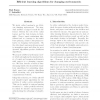Free Online Productivity Tools
i2Speak
i2Symbol
i2OCR
iTex2Img
iWeb2Print
iWeb2Shot
i2Type
iPdf2Split
iPdf2Merge
i2Bopomofo
i2Arabic
i2Style
i2Image
i2PDF
iLatex2Rtf
Sci2ools
114
click to vote
ICML
2009
IEEE
2009
IEEE
Efficient learning algorithms for changing environments
We study online learning in an oblivious changing environment. The standard measure of regret bounds the difference between the cost of the online learner and the best decision in hindsight. Hence, regret minimizing algorithms tend to converge to the static best optimum, clearly a suboptimal behavior in changing environments. On the other hand, various metrics proposed to strengthen regret and allow for more dynamic algorithms produce inefficient algorithms. We propose a different performance metric which strengthens the standard metric of regret and measures performance with respect to a changing comparator. We then describe a series of datastreaming-based reductions which transform algorithms for minimizing (standard) regret into adaptive algorithms albeit incurring only poly-logarithmic computational overhead. Using this reduction, we obtain efficient low adaptive-regret algorithms for the problem of online convex optimization. This can be applied to various learning scenarios, i.e...
Adaptive Algorithms | ICML 2009 | Inefficient Algorithms | Low Adaptive-regret Algorithms | Machine Learning |
Related Content
| Added | 17 Nov 2009 |
| Updated | 17 Nov 2009 |
| Type | Conference |
| Year | 2009 |
| Where | ICML |
| Authors | Elad Hazan, C. Seshadhri |
Comments (0)

